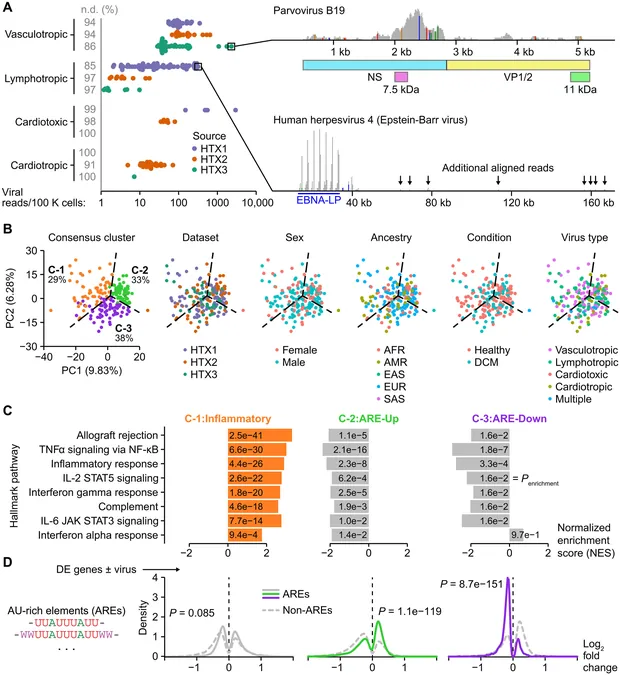
Breakthrough Discovery: How Your Heart Fights Off Viral Infections!
2024-11-20
Author: Mei
What Is Viral Myocarditis?
Viral myocarditis is a serious condition characterized by the virus infiltrating the heart muscle, leading to inflammation that can result in dire complications. Alarmingly, it remains undiagnosed for many until significant heart damage has occurred, making it a leading cause of sudden cardiac death among young adults and athletes. Furthermore, it significantly contributes to dilated cardiomyopathy, a severe form of heart failure. As it stands, there are no effective targeted treatments for viral heart infections, underscoring the urgency of this issue for medical professionals.
Groundbreaking Research Methodology
The research team, spearheaded by Kevin Janes, the John Marshall Money Professor in Biomedical Engineering and Biochemistry & Molecular Genetics at UVA, conducted an in-depth analysis of RNA sequencing data from nearly 1,000 human heart samples. Astonishingly, about 20% of these samples exhibited molecular signs of viral infection — all without exhibiting any symptoms.
Leveraging cutting-edge bioinformatics and computational models, the researchers meticulously surveyed the genetic data from each heart sample to identify specific patterns in genetic alterations. They compared the gene activity of virus-infected hearts against healthy ones to discern which genes were activated or silenced during infection.
Three Key Heart Responses Unveiled
Through their analysis, the researchers uncovered three distinct responses by the heart to viral infections:
1. Inflammatory Response: In a desperate attempt to confront the infection, the heart ramps up inflammation. This reaction, while aimed at combating the virus, can inadvertently lead to long-term damage and is often linked to heart failure.
2. Adaptive Recovery: In this positive scenario, the heart can adjust to the viral stress more effectively, managing the infection without incurring significant harm.
3. Exhaustion Phase: Over time, the heart's ability to fight back diminishes, which can heighten the risk of progressing to heart failure.
Alarmingly, these patterns emerged across all heart samples infected by various viruses, indicating that the heart may employ a universal strategy against infections, paving the way for targeted therapies in the future.
A Pathway to New Treatments
"Deciphering how the heart navigates these viral challenges paves the way for innovative therapeutic strategies aimed at preventing viral infections from escalating into heart failure," stated Janes.
The implications of this research reach far beyond just understanding viral myocarditis. "Our findings create a blueprint for how the heart manages viral stress," added Cameron Griffiths, the study's lead author. "This blueprint not only illuminates the heart's defensive mechanisms but also reveals vulnerabilities that could be strengthened to avert long-lasting damage."
A Broader Impact
These adaptive responses are critical not only for addressing viral myocarditis but could also inform treatments for a myriad of viral infections affecting other organs. Moreover, the research signifies the potential to enhance post-heart transplant outcomes by offering new insights on managing immune system interactions, ultimately protecting patients.
With heart disease remaining one of the leading health challenges today, this research offers invaluable hope — a chance for humanity to better combat the silent threats lurking within our hearts. Stay tuned as we uncover more about how this research may shape the future of cardiology!




 Brasil (PT)
Brasil (PT)
 Canada (EN)
Canada (EN)
 Chile (ES)
Chile (ES)
 España (ES)
España (ES)
 France (FR)
France (FR)
 Hong Kong (EN)
Hong Kong (EN)
 Italia (IT)
Italia (IT)
 日本 (JA)
日本 (JA)
 Magyarország (HU)
Magyarország (HU)
 Norge (NO)
Norge (NO)
 Polska (PL)
Polska (PL)
 Schweiz (DE)
Schweiz (DE)
 Singapore (EN)
Singapore (EN)
 Sverige (SV)
Sverige (SV)
 Suomi (FI)
Suomi (FI)
 Türkiye (TR)
Türkiye (TR)